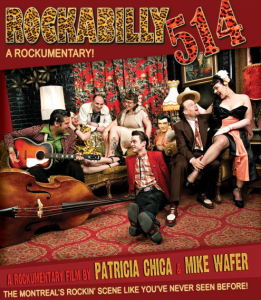People tend to use music as an identifier, a way of organizing themselves into groups. Rockers, rappers, hipsters and punks are among the numerous subcultures around the world, adopting the composite lifestyle. Rumour has it that there’s a new trend that has caught on in Montreal that has people jumping and jiving.
Rockabilly may have started in the early 1950s, but it seems to have experienced a revival in our city with a new generation of fans. Rockabilly is a vibrant style of music that combines elements of country and blues. Artists including Carl Perkins, Johnny Cash and Bill Haley & His Comets are known to have experimented with rockabilly, but it was Elvis Presley who brought the style to the mass media in 1954.

Rockabilly broke the barriers of the ‘50s play-it-safe kind of music. It moved away from mainstream and expressed a sense of freedom and rebellion, and the rockabilly subculture seems to revere the bold and innovative ways of this era.
Rockabilly 514 is a 2008 rockumentary that sheds light the growing rockabilly community in Montreal, documenting the lives of devoted followers of this movement. The film is narrated by Concordia University professor, author and ethnomusicologist, Craig Morrison. “Rockabilly is one of the most important of the styles that are part of the genre rock and roll,” said Morrison. He believes Montreal feels the effects of that because “Elvis was big everywhere!”
“Since the Stray Cats emergence in the early ‘80s, [rockabilly] has been present again, and seems here to stay,” said Morrison.
Since 2006, Montreal’s Jive Studio has been offering rockabilly jive lessons, combining swing, rock and roll and rhythm and blues. Communications director of Jive Studio, Chantal-Irène Coulombe, signed up for classes in 2010 because of her reverence for ‘50s music. “It is a lifestyle,” says Coulombe. “There are people that are purists when it comes to the rockabilly era.” It truly is a throwback to easier times.
Jive Studio is also responsible for hosting events at the Rialto Theatre, M-Bar and l’Alizé where Bettie Page look-alikes and Jimmy Dean greasers come together for a night of dancing and drinking.
The last event at the Rialto Theatre began with basic how-to dance steps for the newbies, but it didn’t take long for the place to be crawling with people decked out in polka dots and gelled hair. The night went on to play fun and energetic music like “Good Golly Miss Molly” and “Great Balls of Fire,” followed by a live set from Montreal rockabilly band Rocket ‘56.
The rockabilly subculture is growing and Coulombe agrees. “When I started dancing we only had around 40 to 50 dancers in total signed up in the school. Now we have 200 per term!”
According to Morrison, we owe credit to Sophia Wolff, a well-versed dancer who returned from London and “brought jive dancing to Montreal.” After releasing a popular instructional video, Do the Jive! in 2002, Wolff became privy to the niche of rockabilly jive in the city and “we are still feeling the ramifications of that,” said Morrison.
It proves to be true as this year marks the ninth edition of the Red Hot & Blue Rockabilly Weekend that will take place at the end of August at the Rialto Theatre. The four day event includes disc-jockeys from Canada, the United States and Europe: 12 bands, free dance lessons from Jive Studio, as well as 1950s fashion shows and vintage car shows.
It’s clear that this feel good kind of music and lifestyle attracts many Montrealers. Rockabilly and all of its quirks are major identifiers for those who belong to this unique subculture. For some it may be a negation to mainstream trends, but the rockabilly scene shares with it a sense of freedom and self-expression that Montrealers seem unable to shake!
Jive Studio is located at 24 Mont-Royal Ave. W., suite 202.




